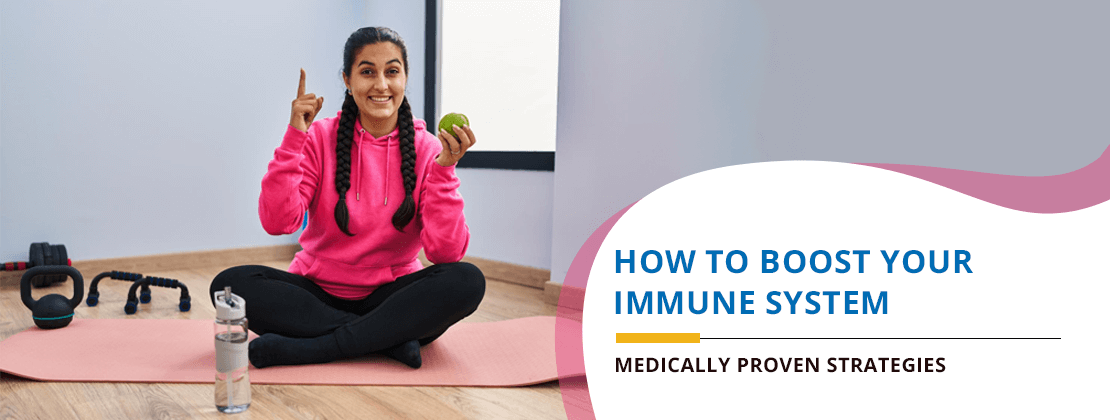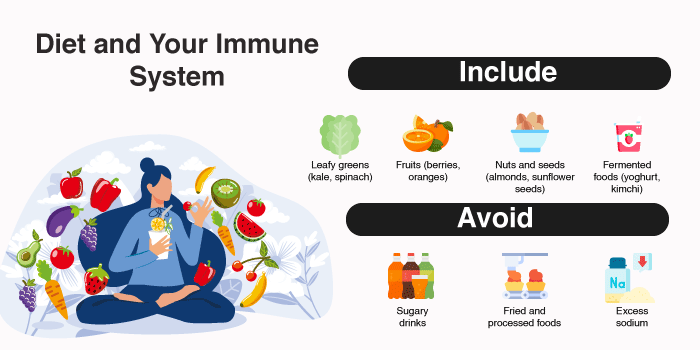
Home / Blog / How to Boost Your Immune System: Medically Proven Strategies
Having a healthy immune system is more important than you think.
Many know that it protects us against various infections. However, our immune system also plays a significant role in reducing the risk of cancer formation, promoting overall wellness, supporting the normal functioning of different organs in the body, and preventing the development of various autoimmune diseases.
In this article, we will learn about the different components of the immune system and, most importantly, understand the best approaches to enhance its functioning.

Our immune system comprises various components, including white blood cells, the thymus, the spleen, lymph nodes, and bone marrow.
It fights against various diseases by detecting foreign substances, reacting to them, or retaining memories of old infections, allowing for protection against them in the future.
Nevertheless, the functioning of this system may be affected by age, stress, poor diet, lack of exercise, and other diseases.
If a person gets sick often, has difficulty healing wounds, feels tired most of the time, and experiences chronic inflammation, then he or she may have a weak immune system. This suggests that the immune system not only prevents diseases but also regulates overall well-being.
Let’s explore some medically backed strategies that can help increase immunity naturally and sustainably:
Eating well keeps you from getting sick. Some types of food have vitamins that improve immunity, and they include:
Additionally, a fibre-rich diet promotes gut microbiota, which is essential for controlling immunological response.
Nutritionists often emphasise a whole-food diet over processed alternatives for immune support.
Physical activity aids in the movement of immune cells, blood flow, and the lowering of inflammation.
Research indicates that individuals who engage in moderate exercise frequently experience low illness rates and quicker recoveries.
Insufficient rest modifies immunity and reduces the synthesis of anti-infection cytokines. The Sleep Foundation states that poor sleep reduces the effectiveness of vaccines and increases susceptibility to viral infections.
Stress triggers the HPA axis, leading to increased cortisol and a weakened immune system. Long-term stress causes inflammation throughout the body, an unhealthy digestive system, and hormonal imbalances.
Practical ways to reduce stress:
Healthcare providers often integrate mental health support into immunity-enhancement programs, acknowledging the strong link between stress and physical well-being.
Hydration is essential for the flow of lymph, the carriage of food, and the removal of poisons from the body.
Smoking damages lung tissue and impairs immune cell function. Excessive alcohol weakens your ability to fight off infections and disrupts gut flora.

What you eat today determines your immune response tomorrow. Malnutrition is the leading cause of impaired immune system function globally.
Include:
Avoid:
Eating mindfully is one of the simplest ways to boost your immune system from within.

Supplements can play an important role in optimising immune system support, especially when dietary intake is insufficient. Some commonly recommended supplements include:
But supplements should not be taken blindly. Blood tests and medical consultation are essential. It is essential to consider routine tests for nutrient deficiencies before taking supplements to ensure safety and efficacy.
Maintaining strong immune health is a continuous journey. Research indicates that if you are careful about what you eat, exercise regularly, sleep enough, and handle stress well, then you will be able to increase immunity naturally, which will make you stronger in fighting against diseases of all kinds.
If you’re facing chronic fatigue, frequent infections, or simply want to stay ahead of seasonal illnesses, these immune health tips are your first line of defence. For advanced care and diagnostics, consulting with professionals at the HCG, the best multispecialty hospital in India, can help develop a customised wellness plan.
Start small, stay consistent, and prioritise your health, because a strong immune system protects more than just your body. It supports your freedom to live fully.